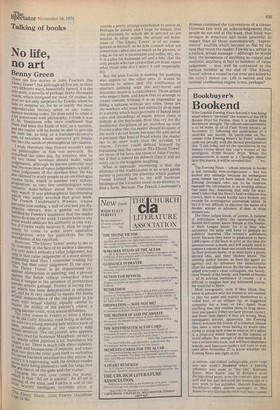Bookbuyer's
Bookend
If the London Evening News fancied it was being smart when it "revealed" the winners of the 1979
Booker Prize for Fiction, then it is sillier than Bookbuyer thought. The official announcement is to be made, as all of Fleet Street knows, on November 27, following the publication of a short-list last month. At lunch-time on November 5 the Evening News's 'In Town' column came out proudly with the factual proclamation that "I can today end all the speculation in top literary circles about this year's winner of the prestigious £5,000 Booker Prize. When the announcement is made at a Claridges dinner later this month, it will be revealed that . . ." etc, etc.
The Evening News — whose interest in books is not normally over-conspicuous — has not broken any embargo because no embargoed press release has yet been issued. Nor has the Evening Standard who, not to be outdone, repeated the information in its evening edition that same day. Assuming (but only for argument's sake) that the News's bald revelation was correct, then it would hardly have broken any records for investigative journalism either. In fact it is not difficult to discover the name of a Booker winner in advance, if that is what amuses you.
The three judges know, of course. A number of individuals within the sponsoring firm, Booker McConnell, know. People at the National Book League know, for it is they who administer the prize and have to prepare its publicity material. The winner's publishers know, because they have to guarantee to have 3,000 copies of the book in print at the time the announcement is made, and will usually need to prepare a reprint at least one month beforehand. So their printers know, or at least have a pretty shrewd idea, and their binders know. The winning author knows, as does his agent (or agents) and by inference the unsuccessful short-list candidates know. By the time you have added everyone's close colleagues, the family, close friends of the family, and friends of friends — all in strictest confidence of course — it is difficult to imagine how any interested journalist could fail to know.
Most newspapers, even if they think they know in advance who the winner is, are content to play the game and restrict themselves to a veiled hint, or an oblique tip, or suggested sympathy for a loser or two. Apart from anything else, this enables them to brag about their percipience if they are later proved correct, and retain their dignity if they are wrong. Most newspapers (except, apparently, the Evening News) welcome the notion of a common release date since it saves them having to waste time trying to scoop each other in what is, let's admit it, a relatively minor matter in the context of world affairs. But enough of this moralising, It was a second-rate stunt, and will have impressed nobody, and Spectator readers will have to wait until after November 27 to know whether the Evening News was right or not.
A serious, and indeed unforgivable, error crept into last week's Bookend when a passing reference was made to "the late" Kathleen Raine. Miss Raine, one of Britain's most distinguished poets, is on the contrary alive and well and has just delivered the manuscript of a new work to her. publisher, Hamish Hamilton, Bookbuyer offers sincere apologies to Miss Raine for any distress the item may have caused.


































 Previous page
Previous page